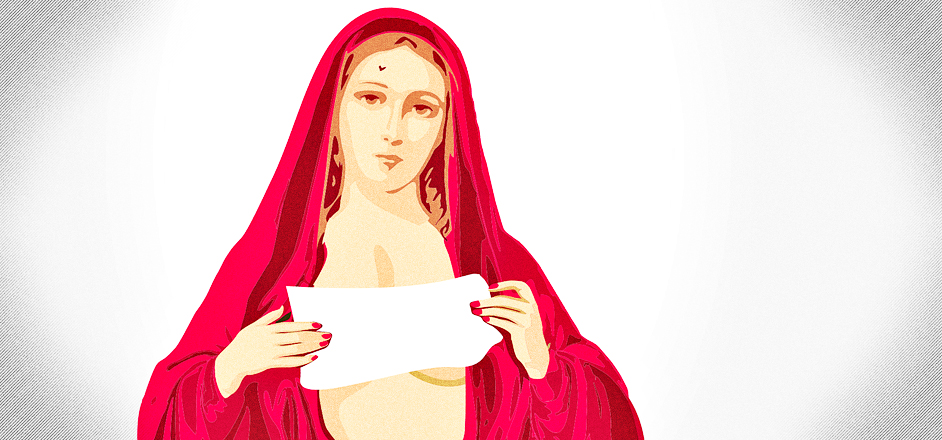Virginity has always been sacred. It’s long been considered a man’s ultimate wedding gift. It's promised to Muslim men 72 times in the afterlife. It symbolizes a woman’s value, ensuring she's pure, clean and untouched.
Throughout history, the concept has been worshipped more than Jesus Horatio Christ himself. And although the societal constructs of marriage and sexuality have drastically changed since the hymen-glorifying days of yesteryear, the ideas surrounding virginity haven’t budged.
My unhealthy fixation with virginity was passed down by my mother, who instilled in me her traditional views about the importance of waiting. The build-up, the disappointment, and the shame inherent in having sex for the first time were all the outcomes of her outdated teachings.
In the battlefield of changing the way we see virginity, moms are on the frontlines. They have the unparalleled power to eliminate the myths, the stigmas and the shame associated with virginity by refusing to pass these damaging ideas on to their daughters.
LOSING YOUR VIRGINITY IS A LOSS
There’s something disturbing in even the phrasing of “losing your virginity.” Why would anyone want to equate their first consensual sex act with loss?
There’s a lot to be gained from the first time someone enjoys your genitals. You gain a new experience, intimacy with a partner, the sensation of sexual pleasure and a better idea of what you like and dislike in bed.
Unfortunately, this sense of “loss” is more prevalent in women’s experiences. Men’s inaugural lay is celebrated — considered “scoring.”
However, men can be crippled by their virginities just the same. Often, male virgins reach an age when they start to consider their sexual inexperience as a humiliating defect.
Whether they were never presented with sexual opportunities or they simply turned them down, men can reach a point where they’re so embarrassed by their virginity that that shame seeps into every corner of their lives — their interactions with people, their confidence and their ability to pursue close relationships.
Virginity is seen as a momentous milestone in many people’s lives, but is realistically only one small step in a sexual life of many thresholds — say, the first time you have an orgasm, the first time you have sex with a new person, or the first time you fuck in an old British telephone booth while dozens of strangers watch.
VIRGINITY IS TIED TO VALUE
Virginity is so highly valued that women can auction it off for millions of dollars.
Our fascination with popping cherries has even inspired barely legal pornography, a type of virginity-loss erotica. The paradoxical narrative in nearly every video is that innocent schoolgirls turn into voracious sex fiends overnight. It’s pretty damn close to what’s expected of women in the real world.
When my mother broached the subject of virginity, she asked if I “gave it up.” She’d made it abundantly clear that my first fuck was such a precious gift that no boy could be worthy of receiving it. When I told her I’d given it to my boyfriend of two years, she was profoundly disappointed. Sixteen was too young, and now my value was irreversibly diminished.
Consider the alternative, the route that many of my closest friends took. They waited for the perfect person and the perfect moment, but it never seemed perfect enough. They waited until they felt they missed the boat, and they were the only girl they knew still sporting a V-card. They felt so ashamed that they slept with someone just to get it out of the way, and once again … were left feeling miserable.
No one wins under the pressure to fit the standards of what society tells us to be sexually. Virginity does not devalue women’s worth. A penis is not a magic wand that transforms us forever.
YOU’RE DAMNED IF YOU DO, DAMNED IF YOU DON’T
To instill their antiquated values, some parents still send their daughters to purity balls, where young girls pledge their virginity to their fathers until husbands come along. Little girls as young as six years old vow to remain “pure” until marriage.
Of course, keeping these promises is easier said than done. “Loopholes” in the subjective definition of virginity — like only having anal sex or sticking to the Mormon dick soak — allow those with abstinence pledges to find workarounds for their sexual desires.
Which highlights yet another fatal flaw in the concept of virginity: no one knows how to define it. Many argue the idea completely excludes the entire LGBT community. By the standard interpretation of P in V penetration, lesbians are doomed to die as virgins.
The misogynistic myths surrounding virginity — that having sex for the first time will be an irreversible transformation that changes your body and mind; that there’s a “respectable age” and a “right” way to lose your virginity; and that how you lose it will affect the rest of your life — are harmful ideas that can only be stamped out by sex-positive mothers’ powerful influence on future generations.
To quote "The Breakfast Club": “If you say you didn’t, you’re a prude. If you say you did, you’re a slut. It’s a trap.” Let’s stop setting the traps.
[cover photo by tiburi via Pixabay // originally published February 07, 2018]





Leave a Reply
You must be logged in to post a comment.